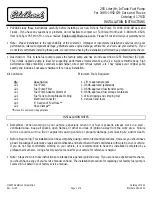
In addition, your vehicle has “dual stage” frontal air
bags, which adjust the amount of restraint according to
crash severity. For moderate frontal impacts, these
air bags inflate at a level less than full deployment. For
more severe frontal impacts, full deployment occurs.
If the front of your vehicle goes straight into a wall that
doesn’t move or deform, the threshold level for the
reduced deployment is about 10 to 16 mph
(16 to 25 km/h), and the threshold level for a full
deployment is about 20 to 25 mph (32 to 40 km/h). The
threshold level can vary, however, with specific
vehicle design, so that it can be somewhat above or
below this range.
If your vehicle strikes something that will move or
deform, such as a parked car, the threshold level will be
higher. The driver’s and right front passenger’s frontal
air bags are not designed to inflate in rollovers, rear
impacts, or in many side impacts because inflation
would not help the occupant.
Seat Position Sensors
Vehicles with dual stage air bags are also equipped with
special sensors which enable the sensing system to
monitor the position of both the driver and passenger
front seats. The seat position sensor provides
information which is used to determine if the air bags
should deploy at a reduced level or at full depoyment.
Side Impact Air Bags
Your vehicle may or may not have a side impact air
bag. See
Air Bag Systems on page 1-70. Side impact air
bags are designed to inflate in moderate to severe
side crashes. A side impact air bag will inflate if
the crash severity is above the system’s designed
“threshold level.” The threshold level can vary with
specific vehicle design. Side impact air bags are
not designed to inflate in frontal or near-frontal impacts,
rollovers or rear impacts, because inflation would not
help the occupant. A side impact air bag will only deploy
on the side of the vehicle that is struck.
Air Bag Systems
In any particular crash, no one can say whether an air
bag should have inflated simply because of the damage
to a vehicle or because of what the repair costs were.
For frontal air bags, inflation is determined by the angle
of the impact and how quickly the vehicle slows down
in frontal and near-frontal impacts. For side impact
air bags, inflation is determined by the location
and severity of the impact.
The air bag system is designed to work properly under
a wide range of conditions, including off-road usage.
Observe safe driving speeds, especially on rough
terrain. As always, wear your safety belt. See Off-Road
Driving with Your Four-Wheel Drive Vehicle in the
Index for tips on off-road driving.
1-77
Summary of Contents for 2003 Yukon XL
Page 5: ...These are some examples of vehicle symbols you may find on your vehicle v ...
Page 6: ...Model Reference This manual covers these models Yukon Yukon XL vi ...
Page 64: ...Tahoe Yukon Second Row Seat Third Row 50 50 Split Bench Seat 1 58 ...
Page 94: ... NOTES 1 88 ...
Page 157: ... NOTES 3 3 ...
Page 158: ...Instrument Panel Overview 3 4 ...
Page 282: ... NOTES 3 128 ...
Page 372: ...When you open the hood on the VORTEC 8100 V8 engine you ll see the following 5 14 ...
Page 460: ...See Engine Compartment Overview on page 5 12 for more information on its location 5 102 ...
Page 488: ...Maintenance Record cont d Date Odometer Reading Serviced By Maintenance Record 6 20 ...
Page 500: ... NOTES 7 12 ...
















































